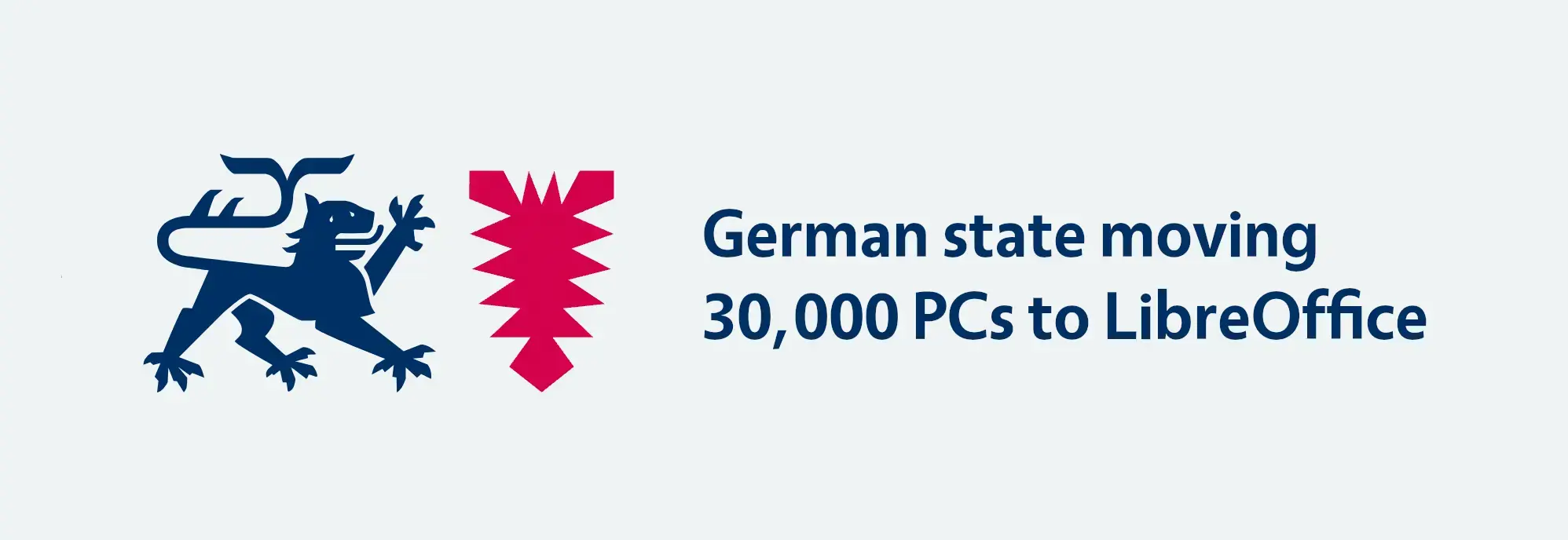Schleswig-Holstein, the northern German federal state, will be a digital pioneer region and the first German state to introduce a digitally sovereign IT workplace in its state administration. With a cabinet decision to introduce the open-source software LibreOffice as the standard office solution across the board, the government has given the go-ahead for the first step towards complete digital sovereignty in the state, with further steps to follow.
The some 30,000 public employees will replace Microsoft Office with LibreOffice, Windows with a yet-to-be-determined Linux desktop distro, and use Nextcloud, Open Xchange/Thunderbird, and the Univention Active Directory (AD) connector to replace Sharepoint and Exchange/Outlook. The state also intends to replace Telekom-Flexport by an Open Source solution.
“The use of open source software also benefits from improved IT security, cost-effectiveness, data protection, and seamless collaboration between different systems,” says Dirk Schrödter, digitalization minister for the German state of Schleswig-Holstein.
“We have no influence on the operating processes of [proprietary] solutions and the handling of data, including a possible outflow of data to third countries,” he adds.
“We have a great responsibility towards our citizens and companies to ensure that their data is kept safe with us, and we must ensure that we are always in control of the IT solutions we use and that we can act independently as a state.”
As The Document Foundation, the organization backing LibreOffice, put it, “The term digital sovereignty is very important here. If a public administration uses proprietary, closed software that can’t be studied or modified, it is very difficult to know what happens to users’ data.”



Last time they tried this (that was Munich IIRC) it was just too early. All they really had access to was OpenOffice, which - and I appreciate all the work that went into it by all the selfless contributors! - was kind of shit. Now there are a least three office suites with decent MS compatibility, which is critical for being a functioning part of a larger organization, not to mention Office365 web if worst comes to worst. At least they wouldn’t have to roll back everything if they encounter problems, like Munich did.
This is great news.
I think it’s important to remember that LiMux, the Linux project in Munich, didn’t really fail because the software didn’t work. The city had commissioned a study that blamed bad implementation, bad internal cooperation, and bad administration. It explicitly did not recommend that the project be shut down. Unfortunately, this recommendation was ignored by the mayor, who was previously responsible for convincing Microsoft to move its German headquarters to Munich and who calls himself a “Microsoft fan”.
So it’s probably worth noting that the success of such large projects doesn’t only depend on the viability of the software. It’s also very much dependent on the lobbyists the project is up against, especially in the public sector.
I recalled that too. It was like 15 years ago think. The whole thing was a disaster. Adoption was as much an issue as compatibility. Linux and LibreOffice has come along a long way since then. But so did MS. Not even google manages to compete with the level of integration and interoperability MS has. Also, being a state organized enterprise, you just know the transition phase is gonna be chaos incarnate. I just hope the top management is ready for the fight. I truly believe it’s worth it.
I don’t know if it is fair to call it a disaster. I don’t know enough from the inside, but I believe in retrospect the goal was maybe to ambitious or plain wrong.
They were attempting to port huge amounts of decades old Office macros to OpenOffice. That failed, but before the LiMux project they had already failed to migrate the same to a modern version of MS Office.
The goal for LiMux was to be a better Windows than the best Windows Microsoft would offer at the time. Literally impossible.
That combined with strong lobbying and users confused with a different UI and probably a lot of small day-to-day issues (which happens with any software, but can make an IT department look bad) made it politically hard to sustain an ‘experiment’.
The current IT lead of Munich, hired after migrating back to Microsoft, does not seem to be a Microsoft fan.
What are the 3 office suites? I only know LibreOffice (and OpenOffice, but I don’t count that).
OnlyOffice is not bad. It’s not free, but SoftMaker has great MS Office compatibility, and is Linux-native. Then there are several I haven’t tried: KDE’s suite, Gnome’s, Yozo Office, FreeOffice, and honestly, Google’s suite is pretty good with MS compatibility if you just throw everyone in the web (which is what they’ll get with 365 these days, anyway). The biggest issue with GSuite IME is scalability. Enterprise-scale spreadsheets can kill a web browser.